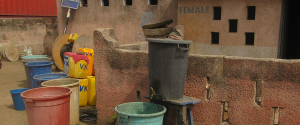
In 2019, I completed my PhD, ‘Opening the doors to the water, sanitation and hygiene needs of women from the onset of the perimenopause’ at Loughborough University, UK. The WASH sector needs to act now to meet the needs of perimenopausal women with existing solutions. I specialise in providing capacity building for the WASH sector on how to integrate the needs of perimenopausal women into WASH programmes. My bespoke workshop has reached WASH professionals and Masters students from India, Nigeria, Ghana, Switzerland, Germany and the UK to date, and is available for organisations to book now. A practical guidance document for the WASH sector on addressing perimenopausal women’s needs was published by the Sanitation Learning Hub in 2023.
What is the perimenopause?
The perimenopause is the transition phase to menopause, when menstruation permanently ceases. It usually happens to women aged in their late 40s and 50s. Women can experience different symptoms which require the support of adequate WASH to be managed, including but not limited to:
- Hot flushes
- Night sweats
- Heavy menstrual periods (up to 80ml, or 6 tablespoons of blood lost)
- Irregular menstrual periods
- Urine incontinence
- Ageing related joint pain
- Dizziness
- Palpitations
These symptoms can last for several years. Women are considered to be perimenopausal if they are experiencing these symptoms, and menopausal if they have not had a menstrual period for 12 consecutive months.
Why is WASH important for perimenopausal women?
Women need access to adequate WASH to manage their symptoms. The irregularities of perimenopausal symptoms such as heavy and erratic menstrual periods and sweating mean that women need access to WASH facilities for meeting different needs.
Bathing and laundry
Perimenopausal women need access to user friendly bathing infrastructure which is safe to use on a 24 hour basis. Symptoms such as night sweats, heavy menstrual periods and urinary incontinence can leave women feeling unclean and needing to wash at any time. Accessible laundry facilities are also important for women to be able to wash their clothes which are easily stained by perimenopausal symptoms. Access to a regular water supply is key for perimenopausal women to maintain good hygiene.
Menstrual health and hygiene
Heavy and erratic menstrual periods can occur at any time as women’s menstrual cycles become irregular during the perimenopause. Women’s needs for effective menstrual hygiene materials and products to absorb heavy blood flow during the perimenopause are neglected in existing debates around menstrual health in the WASH sector. Adequate disposal facilities and waste collection services are important for women to dispose of heavily soiled menstrual materials safely and discreetly. As perimenopausal women bathe more frequently due to heavy periods, wastewater can become easily stained with blood. Adequate covered drainage connected to bathing facilities can provide dignity for perimenopausal women as they try to manage heavy menstruation.
Drinking water
Symptoms such as hot flushes and sweating can mean that women drink more water to relieve their perimenopausal symptoms and to maintain good health. Access to a safe drinking water supply is critical for perimenopausal health.
For more information on WASH for perimenopausal women, please see:
- Bhakta, A. with Vernon, N. (2023) The Menopause: Hidden WASH Needs SLH Learning Paper 16, Brighton: Sanitation Learning Hub, Institute of Development Studies
- Bhakta A, Esseku H, Esseku Y, Fisher J and Reed BJ (2021) ‘The hidden WASH needs of perimenopausal women‘ Journal of Water, Sanitation and Hygiene for Development
- It’s time for the water, sanitation and hygiene sector to hear about the perimenopause, WASHMatters, WaterAid
- Bhakta A, Fisher J and Reed BJ (2019) ‘Unveiling hidden knowledge: discovering the hygiene needs of perimenopausal women’ International Development Planning Review Vol. 41 No. 2 pp. 149-171
- Sanitation ‘secrets’ and menstrual hygiene management: What can perimenopausal women tell us?
- Cleansing in hidden spaces: the bathing needs of perimenopausal women
- Finding hidden knowledge in WASH: effective methods for exploring the needs of perimenopausal women in Ghana
- WASH for the perimenopause in low-income countries: changing women, concealed knowledge?
I can provide you with training on incorporating the needs of perimenopausal women in WASH programmes. Feel free to contact me for more information on my workshop.